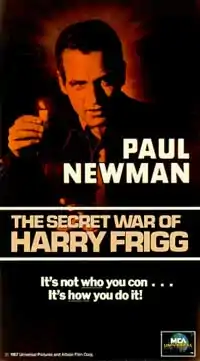The Secret War of Harry Frigg
The Secret War of Harry Frigg is a 1968 comedy film set in World War II. It was directed by Jack Smight and stars Paul Newman.
| The Secret War of Harry Frigg | |
|---|---|
 | |
| Directed by | Jack Smight |
| Produced by | Hal E. Chester |
| Screenplay by | Peter Stone Frank Tarloff |
| Story by | Frank Tarloff |
| Starring | Paul Newman Sylva Koscina |
| Music by | Carlo Rustichelli |
| Cinematography | Russell Metty |
| Edited by | J. Terry Williams |
Production company | Albion Film Corp. |
| Distributed by | Universal Pictures |
Release date |
|
Running time | 110 minutes |
| Country | United States |
| Language | English |
| Box office | $3,500,000 (US/ Canada)[1] |
Plot
Several brigadier generals (American, British, and French) are unexpectedly taken prisoner by the Italians while arguing military tactics in a sauna, which is a public relations disaster. They are held in an Italian villa run as a top-level prison camp by the benevolent Colonel Ferrucci. Being all of the same rank, none is in command and they are forced to plan escapes by committee, with predictably ineffective results.
Headquarters devises a plot to free them by sending in Harry Frigg (Paul Newman). Frigg is a private in the U.S. Army who has a history of escaping from military stockades; he is usually put inside them as he does not want to be a private in the army. As an incentive, he is promised a promotion to sergeant after the generals have been freed. Accepting the mission, Frigg is promoted to major general so that he will outrank all the prisoners, assume command and lead the resultant breakout. Parachuted behind enemy lines, Frigg allows himself to be captured, and is imprisoned in the same jail as are the brigadiers. While they are initially skeptical of Frigg's rank, he has been given a few personal secrets about them that only a senior officer might be expected to know.
Frigg discovers a secret passage from his bedroom to the gatehouse outside the villa's fence, which he intends to use to escape with the other generals. However, Frigg's plan is put on hold when he becomes romantically involved with Countess Francesca De Montefiore (Sylva Koscina), the owner of the castle where the men are imprisoned. Eventually, the escape plan is reactivated.
On the eve of the group's intended escape, Colonel Ferrucci announces that because of the low escape rate in the complex, he is to be promoted to general at midnight the following night. The group decides to put their escape plans off by a day to ensure the Colonel gets promoted to general at least once, despite knowing that his rank will be stripped once they do escape. During the celebration, a Nazi major arrives, and after midnight he announces that Italy has surrendered to Germany, and all present are now his prisoners.
The Germans take the generals to a high-security prison camp for officers. Escape seems hopeless; however, Frigg confesses to being only a private, and is separated from the rest to be delivered to a basic holding camp for NCOs. Escaping his guard, he then breaks back into the officers' camp, eventually freeing them all and capturing the Major in the process.
The film concludes with Frigg ending the war as a master sergeant who is offered the charge of a radio station and a promotion to second lieutenant. Whilst discussing the role, Frigg passes the countess' castle and decides to use it as the base of the radio station.
Cast
- Paul Newman as Private/Major General/Sergeant/2nd Lt. Harry Frigg
- Sylva Koscina as Countess Francesca De Montefiore
- Andrew Duggan as Brigadier General Newton Armstrong
- Tom Bosley as Brigadier General Roscoe Pennypacker
- John Williams as Brigadier Francis Mayhew
- Charles Gray as Brigadier Adrian Cox-Roberts
- Vito Scotti as Colonel Enrico Ferrucci
- Jacques Roux as Brigade General Andre Rochambeau
- Werner Peters as Major von Steignitz
- James Gregory as Brigadier General Homer Prentiss
- Fabrizio Mioni as Lieutenant Rossano
- Johnny Haymer as Sergeant Pozzallo
- Norman Fell as Captain Stanley
- Buck Henry as Stockade Commandant
Production
The film was originally titled Back at the Front.[2]
See also
References
- "Big Rental Films of 1968", Variety, 8 January 1969 p 15. Please note this figure is a rental accruing to distributors.
- Will Real Frank Tarloff Please Stand Up? Stone, Peter. Los Angeles Times 22 May 1966: c6